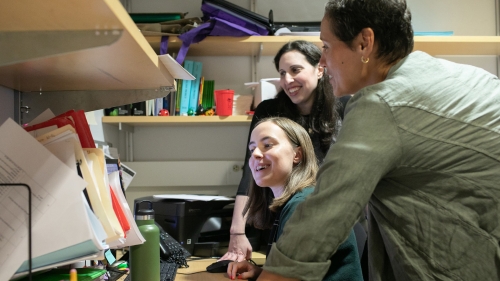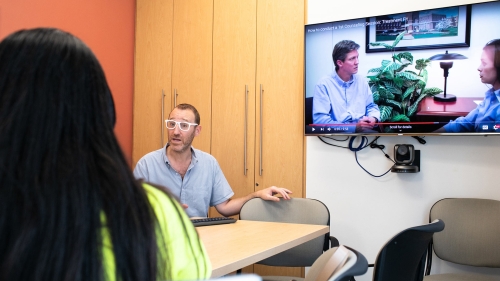

Shabnam Javdani
Associate Professor of Applied Psychology
Applied Psychology
The Institute of Human Development and Social Change
Shabnam Javdani is a clinical and community psychologist who examines and intervenes in the health and mental health disparities created by persistent inequality. Javdani completed her doctoral work at the University of Illinois at Urbana-Champaign in 2012, and completed an APA-approved clinical internship in the Institute for Juvenile Research at the University of Illinois at Chicago prior to coming to Steinhardt. She is the founding Director/PI of the RISE Research Team and the Faculty Director of the NYU Prison Education Program.
The overarching goal of her scholarship is to understand and reduce the development of inequality-related mental health and legal problems and study community and institutional responses to these complex challenges. Javdani's research hopes to advance our understanding of people in context, and to identify meaningful individual- and ecological-level solutions. Javdani approaches this goal with three interrelated areas of inquiry.
The first examines adult and adolescent pathways to violence and disruptive behavior problems. This line of research advances context- and gender-sensitive models to understand crime, addressing the fact that women and girls currently represent the largest growing segments of the criminal and juvenile legal systems. In particular, Javdani investigates the influence of individual and structural trauma (e.g., risky dating relationships), the role of school police and discipline, and access to neighborhood and community resources. At a more macro level, Javdani also investigates the juvenile and criminal legal systems, and how the response of these systems (e.g., policies and practices) may affect outcomes for youth and adults.
The second examines the community and systems’ response to the challenges created by persistent inequality. A particular aspect of this inquiry involves studying the influence of gender. In the context of this work, Javdani conceptualizes and operationalizes gender as both an individual level attribute and a social grouping category with associated gender norms and roles (e.g., Javdani examines women's subjugated roles in intimate partner relationships as a context in which health disparities may arise).
The third integrates research and action to develop and study interventions that target individuals, settings, and systems to reduce and resist inequality, with a focus on evidence-based interventions for youth at risk for legal system contact. For instance, Javdani designed and is experimentally evaluating NYC ROSES, a strengths-based, youth-centered advocacy approach to target changes in girls' opportunity structures (e.g., through providing access to needed resources) and investigates the extent to which such changes are associated with promotion of positive outcomes (e.g., resilience, academic achievement) and reduction of negative outcomes (e.g., arrest/incarceration, mental health symptoms). In addition, Javdani is developing and tailoring a staff training and coaching intervention for incarcerated youth in NYC (SAFE Spaces, with PI Godfrey), and has partnered with the Vera Institute of Justice to examine the practice and policy shifts necessary to end the incarceration of girls at local and national levels.
Across components, Javdani's program of research is characterized by a social justice focus, with an emphasis on the application of research for the urban poor and in under-resourced communities. Javdani uses a variety of methodological approaches, including quantitative, qualitative, and mixed-methodologies.
Selected Publications
- Javdani, S*., Larsen, S.E*., Allen, N.E., Blackburn, A.M., Griffin, B., & Rieger, A. (2023). Mixed methods in community psychology: A values‐forward synthesis. American Journal of Community Psychology, 72, 355-365. (view)
- Berezin, M.N., Javdani, S., Ducat, C., Sims, G., & Godfrey, E. (2023). The critical case file approach: A novel tool for critically analyzing mixed-method data as exemplified in a juvenile legal setting. Psychology, Public Policy, and Law. (view)
- Javdani, S., Berezin, M.N. & April, K. (2023). A Treatment-To-Prison-Pipeline? Scoping Review and Multimethod Examination of Legal Consequences of Residential Treatment Among Adolescents. Journal of Clinical Child & Adolescent Psychology, 52, 376-395 (view)
- Sheehan, A. E., Bounoua, N., Rose, R. E., Sadeh, N., & Javdani, S. (2023). Profiles of Risk for Self-Injurious Thoughts and Behaviors Among System-Impacted Girls of Color. Journal of the American Academy of Child & Adolescent Psychiatry. (view)
- Anderson, V.R., Javdani, S., & Singh, S. (2023). Persistent paternalism: The instantiation of gendered attributions in the system response to girls. Criminal Justice and Behavior, 50, 666-687. (view)
- Rose, R.E., Singh, S., Berezin, M.N., & Javdani, S. (in press). “Roses have thorns for a reason”: The promises and perils of critical youth participatory research with system-impacted girls of color. American Journal of Community Psychology. (view)
- Berezin, M.N., Javdani, S. & Godfrey, E.B. (2022). Predictors of sexual and reproductive health among girls involved in the juvenile legal system: The influence of resources, race, and ethnicity. Children and Youth Services Review, 136, 106426. (view)
- Sichel, C.E., Javdani, S., & Yi, J. (2022). Perceiving fairness in an unfair world: System justification and the mental health of girls in detention facilities. American Journal of Community Psychology, 69, 451-62. (view)
- Javdani, S. (2019). Policing Education: An empirical review of the challenges and impact of the work of school police officers. American Journal of Community Psychology, 63, 253-269. (view)
- Granski, M., Javdani, S., Anderson, V.R., & Caires, R. (2019). A Meta-Analysis of Program Characteristics for Youth with Disruptive Behavior Problems: The Moderating Role of Program Format and Youth Gender. American Journal of Community Psychology, 65, 201-222. (view)
- Javdani, S., Sadeh, N., White, H.I., Emerson, E.M., Houck, C., Brown, L.K. & Donenberg, G.R. (2019). Contextualizing pubertal development: The combination of sexual partners' age and pubertal development confers risk for externalizing but not internalizing symptoms among girls in therapeutic day schools. Journal of Adolescence, 71, 84-90. (view)
- Javdani, S., Singh, S. & Sichel, C.E. (2017). Negotiating ethical paradoxes in conducting a randomized controlled trial: Aligning intervention science with participatory values. American Journal of Community Psychology, 60, 439-449. (view)
- Javdani, S. & Allen, N.E. (2016). An ecological model for intervention with justice-involved girls: Development and preliminary prospective evaluation. Feminist Criminology, 11, 135-162. (view)
- Javdani, S., Abdul-Adil, J., Suarez, L. & Nichols, S. (2014). Gender differences in the effects of community violence on mental health outcomes in a sample of low-income youth receiving psychiatric care. American Journal of Community Psychology, 53, 235-248. (view)
- Javdani, S., Sadeh, N., & Verona, E. (2011). Suicidality as a function of impulsivity, Callous / unemotional traits, and depressive symptoms in youth. Journal of Abnormal Psychology, 120, 400- 413. (view)
- Javdani, S., Sadeh, N., & Verona, E. (2011). Expanding our lens: Female pathways to antisocial behavior in adolescence and adulthood. Clinical Psychology Review, 31, 1324-1348. (view)
- Javdani, S., Sadeh, N. & Verona, E. (2011). Gendered social forces: An examination of the impact of the justice system' response on women and girls' criminal trajectories. Psychology, Public Policy, and Law, 17, 161-211. (view)




